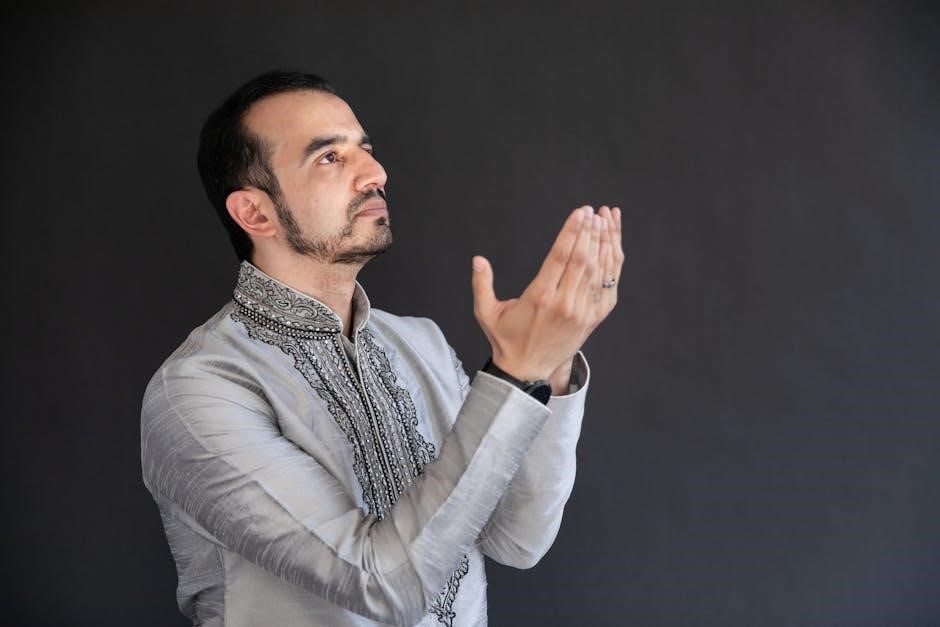
dua arafah pdf
Dua Arafah PDF: An Overview
Dua Arafah is a powerful supplication recited on the Day of Arafah.
A PDF version allows easy access to this prayer.
It’s a resource for ethical, spiritual, and social learning, offering praise, gratitude, and hope.

Significance of the Day of Arafah
The Day of Arafah holds immense significance in Islam.
It marks the perfection of religion.
It is a day of forgiveness.
Allah boasts to the angels about His servants at Arafah.
It offers liberation from Hellfire.
A Day of Forgiveness and Closeness to Allah
The Day of Arafah is uniquely positioned as a time when Allah draws nearest to humanity.
It extends boundless forgiveness.
More souls are liberated from Hellfire on this day than any other.
This day provides an unparalleled opportunity to seek closeness to Allah through sincere repentance and devotion.
It is a chance for spiritual renewal, seeking divine mercy.
Engaging in heartfelt supplications on this blessed day increases the potential for Allah’s grace.
It strengthens the bond between the believer and the Creator.
Perfection of Religion
The Day of Arafah holds immense significance.
It is revered because Allah perfected the religion of Islam on this very day.
This signifies the completion of divine guidance for humanity.
It represents the fulfillment of Allah’s promise to His messengers.
The perfection of religion underscores the comprehensiveness and timelessness of Islamic teachings.
Muslims celebrate this divine completion by seeking knowledge and striving to live according to Islamic principles.
This day serves as a reminder of the blessings of Islam.
It reinforces the commitment to uphold its values in all aspects of life.
Liberation from Hellfire
The Day of Arafah marks a special time.
Allah frees more souls from Hellfire than on any other day.
This act of divine mercy underscores the day’s importance.
Seeking forgiveness on this day is highly encouraged.
It provides an exceptional opportunity for spiritual cleansing.
Making sincere repentance and supplications can lead to salvation.
Muslims strive to maximize their efforts in seeking Allah’s forgiveness.
It’s believed that sincere prayers on this day are readily accepted.
Liberation from Hellfire signifies divine favor and protection.
This liberation motivates believers to strengthen their faith.
It inspires them to avoid actions that displease Allah.
Dua Arafah: Meaning and Importance
Dua Arafah is a profound supplication with immense significance.
Reciting it offers ethical, spiritual, and social lessons.
It embodies praise, gratitude, and hope, enriching the believer’s connection with Allah.
Ethical, Spiritual, and Social Lessons
Dua Arafah, particularly Imam Hussain’s (AS) recitation, provides numerous ethical, spiritual, and social lessons for daily life.
Reflection on the Dua enables a deeper understanding of God.
It fosters feelings of His presence and love, which enhances spiritual reflection.
The supplication is a source of praise, gratitude, and hope, teaching us to recognize our responsibilities to our Creator.
Reciting this Dua helps to enrich our lives by incorporating these messages.
Praise, Gratitude, and Hope
Dua Arafah encapsulates themes of praise, gratitude, and hope, reflecting a profound connection with Allah.
Reciting the Dua allows individuals to express their gratitude for Allah’s blessings and guidance.
The supplication embodies hope for forgiveness, salvation, and a closer relationship with the Divine.
Imam Hussain’s (AS) Dua Arafah serves as a guide, teaching believers to acknowledge and appreciate Allah’s mercy.
It encourages believers to maintain hope in His compassion and unwavering support.

Imam Hussain’s (AS) Dua Arafah
Imam Hussain’s (AS) Dua Arafah is a revered supplication.
It’s known for its profound content and themes.
The Dua teaches about recognizing responsibilities.
Also it teaches about seeking forgiveness from the Creator.
Historical Context and Narration
The Dua Arafah of Imam Hussain (AS) holds immense historical significance.
It was narrated by Bishr and Bashr, sons of Ghlib al-Asad, who accompanied Imam Hussain (AS) on the Night of Arafah.
Imam Hussain (AS) left his tent with reverence and submission, reciting this powerful supplication.
This event took place during a pivotal time, adding depth to the Dua’s meaning.
The narration highlights Imam Hussain’s (AS) profound connection with Allah.
It also teaches about seeking nearness to God and recognizing our responsibilities to our Creator.
The historical context enriches our understanding of the Dua.
Content and Themes
Dua Arafah encompasses profound themes of divine knowledge and our responsibilities to the Creator.
It mirrors well-known supplications in its eloquence and sincerity.
The Dua emphasizes ethical, spiritual, and social lessons for daily life.
Praise, gratitude, and hope are central messages within its verses.
It also delves into recognizing God’s presence and love.
The Dua facilitates deep contemplation, fostering spiritual reflection and learning.
Seeking forgiveness and salvation is a recurring theme, urging believers to turn to Allah.
The content is a comprehensive guide to understanding God and our purpose.
It encourages personal growth through recognition of divine attributes.

Key Themes in Dua Arafah
Dua Arafah centers on recognizing our duties to the Creator.
Forgiveness and salvation are essential themes explored.
The supplication encourages acknowledging our dependence on Allah.
It highlights the importance of seeking divine mercy.
These themes promote spiritual growth.
Recognizing Responsibilities to the Creator
Dua Arafah emphasizes acknowledging our responsibilities to Allah.
The supplication encourages reflection on our duties as servants.
It teaches us about knowing God and our role in creation.
The Dua focuses on understanding divine blessings.
It serves as a reminder of our obligations to show gratitude.
Acknowledging these responsibilities strengthens our relationship with Allah.
This recognition fosters humility and devotion.
The prayer prompts introspection on fulfilling our purpose.
It guides us towards a life of obedience.
This, in turn, enhances our spiritual well-being.
Seeking Forgiveness and Salvation
Dua Arafah is a plea for forgiveness and salvation.
Reciting the Dua on the Day of Arafah is a profound act.
It is a means to seek Allah’s mercy and pardon.
The prayer acknowledges our shortcomings and sins.
It expresses sincere remorse and repentance.
The Dua implores Allah to free us from hellfire.
It asks for His protection from punishment.
This supplication increases hope for divine acceptance.
It aims to purify the heart and soul.
Seeking forgiveness is vital for spiritual growth.
It paves the way for attaining salvation.
Recommended Duas for Arafah
On Arafah, specific Duas are highly encouraged.
These supplications seek forgiveness and blessings.
Reciting these Duas with sincerity amplifies their impact.
They connect us to Allah’s mercy and guidance.
Best Supplications to Make
The Day of Arafah is a prime time for supplication, as Allah is closest to humanity. The most recommended Dua is the essence of Tawhid, declaring that there is no deity worthy of worship except Allah alone, without any partners. This resonates with the prayers of prophets. Seeking forgiveness is crucial, asking for salvation. Including heartfelt and sincere words amplifies the connection. Reciting duas that acknowledge Allah’s sovereignty and express gratitude are powerful. The goal should be to show reliance on Allah in all aspects of life and to recognize His power.
Duas of the Salaf
Reflecting on the Duas of the Salaf on Arafah provides profound insights. The Salaf, righteous predecessors, understood the essence of supplication on this blessed day. Their duas often focused on seeking forgiveness, guidance, and closeness to Allah. They emphasized sincerity and humility in their prayers. Learning and reciting their duas offers a connection to their wisdom. These supplications exemplify reliance on Allah, and a deep understanding of His attributes. Their words can teach us how to express our needs and desires in a way that is pleasing to Allah. Including their example enriches our practice.
Benefits of Reciting Dua Arafah
Reciting Dua Arafah allows one to feel God’s presence.
It promotes spiritual reflection and deeper learning.
This dua fosters a profound connection, enabling us to experience His love and guidance through sincere supplication.
Feeling God’s Presence and Love
Reciting Dua Arafah allows individuals to connect with a sense of divine closeness and experience God’s love. It’s a transformative experience.
Many feel they learn more from reflection on this dua than from years of traditional religious study.
The recitation enables a tangible feeling of God’s presence and love.
Through sincere supplication and contemplation, individuals can experience a profound connection.
This prayer offers a chance to feel the divine’s embrace.
It’s a powerful way to seek nearness and experience love.
The Dua is a pathway to feeling God’s presence.
Spiritual Reflection and Learning
Dua Arafah provides profound opportunities for spiritual reflection and learning.
Reciting the dua offers a chance to contemplate the meaning of faith, existence, and one’s relationship with the divine.
The supplication contains ethical, spiritual, and social lessons that can be incorporated into daily life.
It prompts deep self-assessment, urging individuals to understand their responsibilities to the Creator.
The themes within the dua encourage introspection and offer guidance on living a more virtuous life.
It fosters a connection with God.
It encourages spiritual growth through meaningful reflection.

Resources for Dua Arafah PDF
Dua Arafah PDFs can be found online.
These resources often include Urdu translations.
Online versions and audio recitations are available.
These resources help enhance understanding and connection.
They are easily accessible for personal reflection.
Downloadable PDFs with Urdu Translation
Numerous websites offer Dua Arafah in PDF format, often accompanied by Urdu translations.
These PDFs provide a convenient way to access and read the supplication, especially for those familiar with the Urdu language.
The translations enhance understanding of the Dua’s profound meanings, allowing for deeper connection and reflection. Many files are available for free, facilitating widespread access.
They serve as a valuable resource for Muslims seeking to engage with the rich spiritual content of Dua Arafah, making it accessible and understandable to a broader audience, promoting reflection and introspection.
Online versions and audio recitations
In addition to PDFs, Dua Arafah is widely available in various online formats.
Websites and apps offer the text for easy reading on digital devices.
Furthermore, audio recitations by renowned scholars and reciters are readily accessible, allowing listeners to follow along and immerse themselves in the prayer’s beauty.
These audio versions aid in proper pronunciation and enhance the spiritual experience;
The combination of online text and audio recitations ensures that Dua Arafah is accessible to diverse audiences, regardless of their reading preferences or language proficiency, fostering a deeper connection with the divine.
Practices on the Day of Arafah
The Day of Arafah involves specific practices, including fasting to seek forgiveness.
Engaging in dhikr and sincere supplication is also encouraged.
These acts aim to draw closer to Allah.
Fasting on the Day of Arafah
Fasting on the Day of Arafah is a highly recommended practice for those not performing Hajj.
It is believed that fasting on this day wipes away the sins of the past and coming year.
This act of devotion is a means of seeking forgiveness and drawing closer to Allah.
The significance of this practice is rooted in the immense blessings and opportunities for spiritual growth.
Therefore, Muslims worldwide observe this fast with sincerity and hope.
It is a time for reflection, repentance, and increased devotion;
Engaging in Dhikr and Supplication
The Day of Arafah is an auspicious occasion for engaging in dhikr, the remembrance of Allah, and sincere supplication.
Muslims are encouraged to spend this day immersed in prayer, seeking forgiveness and blessings.
Reciting the Dua Arafah and other recommended duas is a central aspect of this practice.
Through dhikr and supplication, believers strengthen their connection with Allah and express their gratitude.
This engagement fosters spiritual reflection and learning.
It allows individuals to recognize their responsibilities to the Creator.
These acts of worship are essential for seeking salvation.


Leave a Reply
You must be logged in to post a comment.